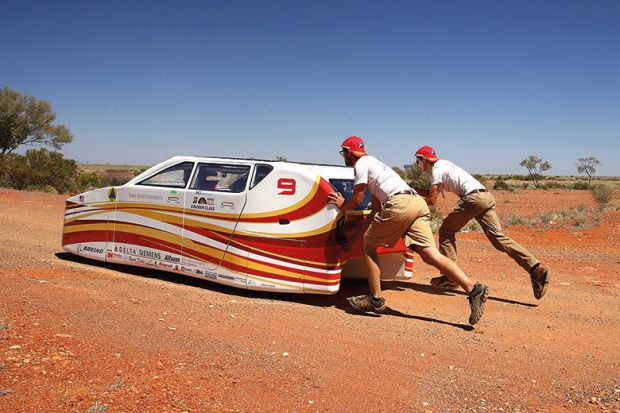Australia’s government has given the country’s key research facilities a A$393 million (£217 million) funding lifeline, with the federal budget also bankrolling additional courses and income support for students from the bush.
Tertiary education groups have reacted fairly positively to a budget that packed few punches and delivered an “awful lot more certainty” for major research infrastructure.
But the representative university body said the good news came in the context of last December’s freeze to higher education teaching grants, which had cost the sector about A$2.1 billion. “Every single university is looking into their budgets and working out how they can offer places,” said Universities Australia’s deputy CEO, Catriona Jackson.
The budget has interrupted a cycle of stop-start funding for expensive facilities like supercomputers, synchrotrons and cutting edge health science laboratories. The government has pledged A$1.9 billion over 12 years, with almost A$400 million of this locked in to be spent by mid-2022.
However, other than the Pawsey Supercomputing Centre in Perth – which will receive an additional A$70 million – the government has not specified which facilities will receive the extra cash.
More detail is expected, possibly within days, when the government responds to a 2016 chief scientist’s report highlighting nine priority research areas for infrastructure spending.
The budget also introduces measures to stop businesses gaming a research and development tax incentive, while allocating A$41 million towards a space agency. “This is a good budget for science,” said Australian Academy of Science president Andrew Holmes.
“It reflects the long-term and strategic approach that is needed for Australia to benefit from science and innovation at a global scale.”
Ms Jackson said the research infrastructure funding would allow Australia to compete internationally on major endeavours. “It ensures that fundamental collaborative research facilities are maintained and fully operational and attract world class researchers,” she said.
Flinders University space archaeologist Alice Gorman said the new space agency would create opportunities in multiple disciplines. “We are talking about an industry that will need engineers, scientists, researchers, archaeologists and even writers and artists," she said.
“Some skin in the game also gives our voice credibility on issues like space junk and space treaties.”
The government has allocated almost A$100 million to fund recommendations from last month’s independent report on regional education. It will relax the eligibility criteria for rural students seeking income support payments, while subsidising hundreds of places at eight “study hubs” in regional centres.
The budget also bankrolls pathway courses for regional students, and confirms that the funding freeze will be relaxed for the universities of the Sunshine Coast, Southern Cross and Tasmania. This will allow the three institutions to enrol students at five new regional facilities which were planned before the freeze was announced.
The government has also defused a long-running dispute over a proposal for a new medical school, located in regional Australia, to end a chronic shortage of doctors in the bush.
Instead, the government will fund a “medical schools network” enabling more students from existing medical faculties to train in rural areas. This will displease medical deans who say the real need is for regionally based specialty training.
The budget earmarks an extra A$250 million for Australia’s cash-strapped vocational education sector, in an acknowledgment that the financing mechanism for a training fund announced last year – a levy on visas for skilled migrants – will not raise enough money.
Register to continue
Why register?
- Registration is free and only takes a moment
- Once registered, you can read 3 articles a month
- Sign up for our newsletter
Subscribe
Or subscribe for unlimited access to:
- Unlimited access to news, views, insights & reviews
- Digital editions
- Digital access to THE’s university and college rankings analysis
Already registered or a current subscriber? Login








